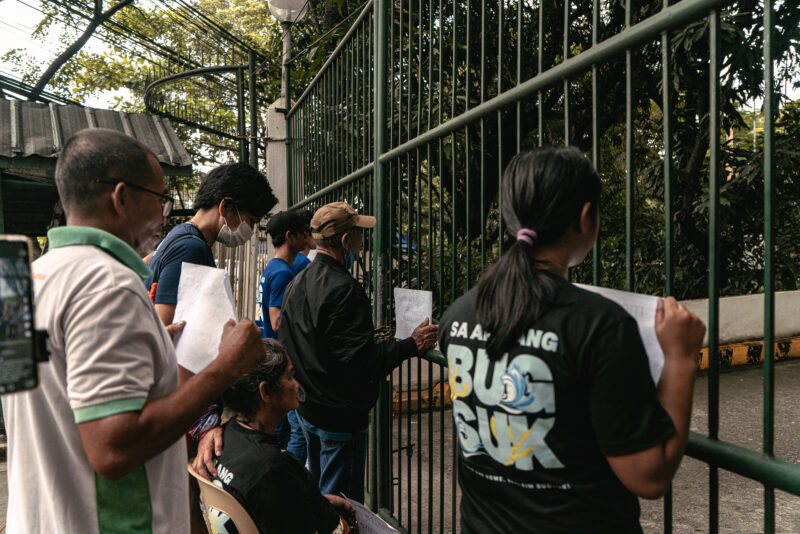Whether platonic or romantic, relationships often ask not for gifts nor grand gestures but total availability when a home is needed.
THE FIVE love languages test attempts to narrow down how love is expressed and received. Some people communicate love through the pleasantries of a thoughtful gift or kind words. In a time when interactions are bound by the corners of one’s screens, expressing love can be simplified to authentic and consistent availability.
Though there are many novel and creative ways to express love, times of uncertainty make people realize that showing love often means simply showing up.
The shoe that fits all
The five love languages test may be convenient in navigating the different ways love can be expressed. However, Theology Lecturer Louie Julian believes that subscribing to this test poses the challenge of expecting the mirroring of love languages. He furthers that some love languages such as physical touch may also be unwanted.
That’s why for Julian, the most vital expression of love transcends the renowned theory. For him, simply being there through one’s availability is more than enough. Yet it is more than just picking up the phone and having a friend on speaker as one multitasks. He says that availability requires total presence—emotionally and spiritually.
Not an on-the-call or clingy type of friend, Brenda* (4 AB COM) shares that availability doesn’t require a 24/7 presence. For her, availability is being with someone during their toughest times to make sure they will come out feeling less lonely or alone.
De La Salle University Biology student Loren Juaban likewise points out that availability transcends physical boundaries and self-centeredness. She shares that it involves sensing what the other person needs without them expressing it and willingly placing one’s needs below the other’s.
“It’s a hard thing to practice availability because it requires you to think about others more,” Juaban shares.
On the other hand, some people like Ima Sonaco (4 AB IS) say that they became more available because of the pandemic. “The online environment has made me more available in the sense that if I don’t make myself available, if I don’t make an effort, how am I supposed to keep up with my relationships?” Sonaco remarks.
Despite her other commitments, Sonaco remarks that making time for people matters to her because she does not want to regret misusing time anymore. Drawing her energy from the experience of losing a loved one, she adds that prioritizing commitments is necessary.
However, being available has its limitations and difficulties. “The hardest would be wanting to be there, but you can’t because there are some things better spoken [face-to-face] than when you’re together [only] through a screen,” Sonaco says.
Noting the challenge of delineating healthy and selfless availability, Juaban points out: “It’s not about how intensely you love but how appropriately you do.”
Drawing lines in the love
Similar to any kind of love, there is only so much you can be available for someone. This is why setting boundaries in managing one’s involvement with others is key to sustainable relationships.
This principle is understood by Sonaco, who notes a strong understanding of herself by not feeling forced to be available for the people she loves. For instance, the level of closeness and the urgency of a friend’s situation are what helps her determine her level of availability.
These standards are shared by Juaban, who explains how she would assess her priorities by keeping a planner. Both Juaban and Sonaco recognize how closeness to an individual can affect one’s availability. Juaban notes: “It’s how much you love someone, whether it’s platonically or romantically. If you’re worth my time then I’ll make time.”
However, making time can come at the risk of staying for a person who only leaves you hanging; “ghosting,” as Brenda calls it. It is not just an overbearing presence through rants that may disrespect a person’s time. For Brenda, the inconsistent presence and absence of another can sometimes take an emotional toll as well.
“It’s emotionally draining to put in the effort for someone who isn’t putting in the [same] effort or making sure you’re feeling okay [too].” she shares, describing that it took some unlearning to find peace in why she valued her relationships.
Conversely, declining a friend’s request for one’s time can be difficult for many. Yet Julian, Brenda, and Sonaco remind that you can always reschedule with the person. Brenda reinforces how saying no for the moment is sometimes the kinder act. “I kind of have to be in a better place to help you out. I can’t help you if I am in shambles,” she says.
To avoid similar difficulties, Juaban notes how setting boundaries helps one discover their weaknesses and strengths. “You know what you can give and what you can’t at a given time. It’s about respecting yourself,” she expounds.
Living for loved ones
Before any grand gesture or sweet touch, love can be expressed by sharing your space when you’re needed. “Just simply saying ‘Hey, I’m here if you can’t talk right now, if you feel emotionally exhausted, if you don’t want me to send you anything, that’s okay, but I just want to let you know I’m here,’” Julian exemplifies.
While availability may look different for everyone, it is a choice that anyone can commit to. “Everyone can do it… In fact I hope it’s something that mature lovers can do before they think of what their love language is,” Julian adds.
At its core, availability is about carefully gifting one’s self to another. That is why dealing with boundaries is the challenge for everyone, whether that involves setting clear ones or overcoming the walls you’ve set around you.
Juaban encourages others to overcome the fear of reaching out and take the risk. After all, she elaborates that it is key to making one feel less isolated and more connected to the world.
The extended quarantine has proven that circumstances shape relationship dynamics, but it is also testament to how people adapt and learn how to strengthen bonds in spite of it.
Stories of Sonaco, Brenda, and Juaban show that love does not always come in the form we prefer to receive or give them. Sometimes, love is affirmed when you answer that ringing call, or you take time to think more deeply about the other’s unspoken needs.
Most times love is tested when your deadlines glare at you, but a loved one’s message pops: “Can we talk?”
*Editor’s Note: The name of the interviewee has been changed at their request in order to protect their identity and privacy.
—







